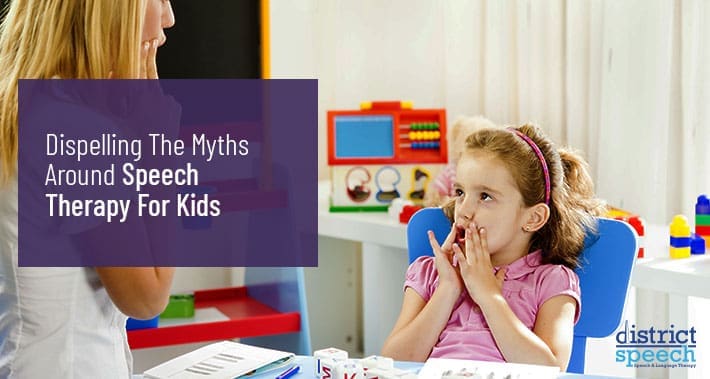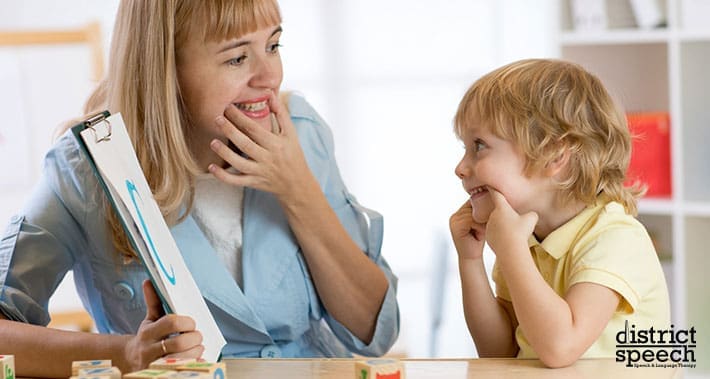
For a long time before speech therapy became widely available, people developed their own beliefs around speech and language issues based on the information they had at the time.
This included a little unintentionally faulty logic.
Luckily, today, there is easily accessible speech therapy for kids and speech therapy for adults, with specialists who have studied for years and who are experts in the science of language.
Unfortunately, some of these old beliefs still linger, but passing these ideas around do more harm than good.
That’s why here at District Speech and Language Therapy we’ve put together a list of myths and truths around speech therapy for kids.
This way, you can act on real information in deciding what steps to take to help your child.
MYTH: My Kid Doesn’t Need Speech Therapy. They’ll Grow Out Of It
Growing up, some children have delayed speech development.
Some will have an actual, noticeable speech impediment, like a stutter.
There is a wide spectrum of speech disorders that can show up in childhood.
The old ‘wisdom’ was that kids would learn to speak properly as they grew older, and as they learned proper pronunciation from adults around them.
But is that true?
The Truth
The truth is that some children will catch up in speaking, if it’s a simple delay in developing speech or language.
However, with an actual impairment, it isn’t that black and white.
A real speech disorder may resolve over time, and perhaps with some at home effort, but that is not guaranteed at all.
Some speech issues need a trained professional to properly correct.
And what’s more, early intervention speech therapy tends to have better results than waiting.
So your child may or may not have a speech disorder, but waiting to see if it gets better on its own may lead to greater issues down the road.
MYTH: It’s Your Fault Your Kid Has A Speech Disorder. You Tried Teaching Them Too Many Languages
Remember back in the day before the internet?
Back before we had exposure to all sorts of different cultures and languages?
There was a belief back then that learning multiple languages could cause people to have trouble pronouncing their own.
There were times where parents were shamed for trying to expose their kids to ‘foreign’ languages.
This was often the case with new immigrants from other countries, or families of foreign descent who tried to keep their mother tongue alive in the next generation.
Well, as it turns out, nothing is further from the truth.
The Truth
Kids learn sounds well when they’re young, and as we age, we gradually lose this ability.
Children are programmed to pick up new sounds and languages, because their survival depends on being able to communicate well.
This means that children learn new languages much more easily than adults do.
Learning a different language may cause your child to speak less for a period of time.
But this is more likely to indicate them working through different grammar and vocabulary in order to get it right.
Don’t be afraid of this.
It doesn’t necessarily mean your child has a speech disorder.
In fact, kids who know multiple languages are statistically no more likely to have a speech disorder than kids who know just one.

MYTH: It’s Your Fault Your Kid Has A Speech Disorder. You Keep Using Baby Talk
Parents get criticized a lot, sadly, and this is one that many used to hear.
There used to be a time when baby talk was frowned upon, and children were expected to behave and speak like little adults.
The myth is that speak baby talk to your infant or young child will encourage speech disorders.
The Truth
While there is a right time to move on from baby talk, it’s not something you need to worry about when your child is still a baby.
In fact, babies will be more attracted to people who have a higher pitched voice and exaggerated facial expressions.
They also respond better to baby talk, as long as it includes rhythm, word repetition, and short, simple sentences.
Speaking like this actually <ahref=”https://districtspeech.com/how-do-babies-learn-language/”>helps your baby learn language.
So go ahead and enjoy it.
It’s more important to have a connection with your developing child through ANY kind of communication, rather than avoid it.
MYTH: Your Child Picked Up Their Speech Disorder From A Sibling/Family Member/Friend
Back in the day, people thought that children could ‘catch’ a speech disorder from someone who suffered from one themselves.
Be it a family member or a close friend, the logic was that children would hear it and mimic the disordered speech, and then develop that disorder themselves.
The Truth
The simple exposure to a speech disorder does not imply that a child will mimic it.
If children pick up speech or language patterns from people around them, consider how many OTHER exposures they have – all to people with regular speech patterns.
Other siblings may have perfect speech, or teachers, parents, neighbors, friends, local shop keepers, and many others.
They will have ample opportunity to hear ‘normal’ speech, and they are much more likely to mimic the majority of speech patterns than the exception.
MYTH: My Kid Doesn’t Need Speech Therapy. They Don’t Stutter Or Have A Lisp
When speech therapy was not as common, parents would generally only take their children to correct a stutter orlisp.
RELATED: Frequently Asked Questions About Stuttering
That’s probably where this myth came from.
Although these two disorders are the most common speech disorders, they are far from the only ones that need treatment.
The Truth
Speech therapy is important for helping children find their voice and become comfortable with it.
It helps them to feel confident with their communication, which they will need to rely on increasingly as they get older.
That’s why we also treat many other speech and language disorders, including:
- Speech issues related to Down syndrome
- Childhood apraxia of speech
- Speech issues related to autism spectrum disorder
- Learning and reading impairments
- Selective mutism
- Dysarthria
- Speech issues related to cerebral palsy
- Nonverbal autism
- Tongue thrust
- Dyslexia
- And many more
MYTH: Speech Therapists Are Just Glorified Babysitters
When speech therapists work with children, they do it in a way that allows children to participate eagerly, with fun and play.
Play is important in your child’s development, and it’s also an important tool to foster learning.
However, this has led to the idea that all we do is play with kids, which is patently untrue.
Speech therapists have studied for years to be able to guide your child through correcting their speech.
The Truth
As mentioned, we use play in order to work with children where they are.
Play allows parents to take away a strategy for helping their children at home between visits, and it gives you an easy way to incorporate the lesson.
It also keeps your child engaged – after all, speech therapy can be fun.
Play is a powerful tool for learning, and that’s what we’re focused on.
Book Your Appointment With District Speech Today
As you see, there is a lot of false information that has been passed down through the years.
To be fair, speech therapy has also changed over the years, but today it’s a well researched, well respected branch of medicine.
If your child is difficult to understand or has a noticeable speech impediment, do them and yourselves a favor and call us at District Speech to set up a consultation.
We can help your child grow into a well spoken communicator.
Book your appointment with District Speech today.
1300 I St NW, Suite 400 E,
Washington, DC 20005
- https://g.page/districtspeech
District Speech and Language Therapy specializes in speech therapy, physical therapy, and occupational therapy solutions, for both children and adults, in the Washington D.C and the Arlington Virginia areas.